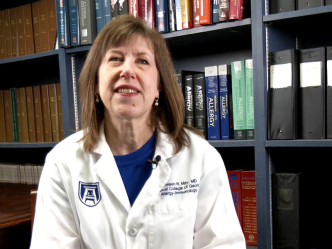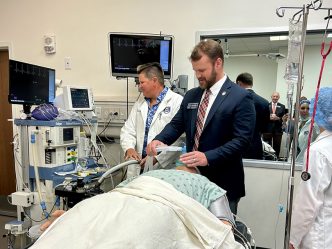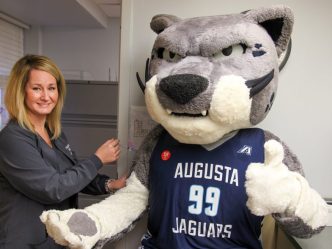Her love for providing Patient- and Family-Centered Care coupled with her passion for academics and education has given Dr. Laura Mulloy the opportunity to build her career and inspire the next generation of doctors at the same time.
“I chose nephrology because of a love of physiology and the inspiration of a mentor. When I was an intern, he was teaching us, went to the blackboard and drew a functional diagram of the nephron with all of the channels and ways that electrolytes and water were handled. It was complex, but such perfect physiology,” said Mulloy, chief of the section of Nephrology in the Department of Medicine at the Medical College of Georgia. “I wanted to emulate him and master that maze of pathways and science.”
She said this physician was a thoughtful and inspiring teacher who was able convey difficult information in a manner which learners understood. Mulloy wanted to be able to inspire and educate others in the same fashion.
Fast forward about 30 years. Mulloy not only cares for patients with kidney issues and teaches future nephrologists how it’s done, but she also mentors junior faculty. Young academic physicians have multiple demands on their time, including patient care and education, which can be daunting. The key to success for junior faculty is coaching from senior faculty, said Mulloy.
“When I was the interim chair for the Department of Medicine, I noticed there were many new to mid-career faculty who were doing great work clinically and in the classrooms. What was missing was a platform to facilitate their academic advancement. I wanted to show them we value them as clinical educators and academicians.”
Ten years ago, Mulloy created the Department of Medicine Mentoring Program with the assistance of Dr. Jennifer Giancola at Saint Louis University and the endorsement of the dean.
It is a one-year program pairing junior faculty protégés with senior faculty mentors. Based on where junior faculty are looking for development, a selection committee pairs each with a senior faculty member. Development areas include research, education, programmatic growth and administrative/leadership. Along with career goals, the selection committee also considers how personalities will mesh.
The program has been largely successful, particularly in the scholarship area, said Mulloy. Through good mentorship, time management, and example, the protégés developed research projects and published articles. This success facilitated promotion to the next academic rank for many of the protégés.
While some were able to make the jump to full professor, others needed a little more mentoring. That’s the reason Mulloy started the Advanced Faculty Mentoring Program about two years ago.
“I talked with several faculty members who were stuck in their academic rank for years because they lacked the scholarship piece on their CV,” Mulloy said. “The advanced mentoring program focused on ways they could incorporate scholarship into their busy schedules, such as creating and implementing quality improvement projects. We also assisted with their promotion packet preparation. Three of the first four members of the program were promoted after completing their contract.”
Recently, Mulloy reached out to Giancola to arrange a visit to Augusta University this spring to discuss mentoring programs with other senior faculty members, such as Dr. Lara Stepleman, director of faculty success at MCG.
Mulloy hopes to stimulate the development of additional mentoring opportunities for protégés throughout the state’s medical school.
 Augusta University
Augusta University





